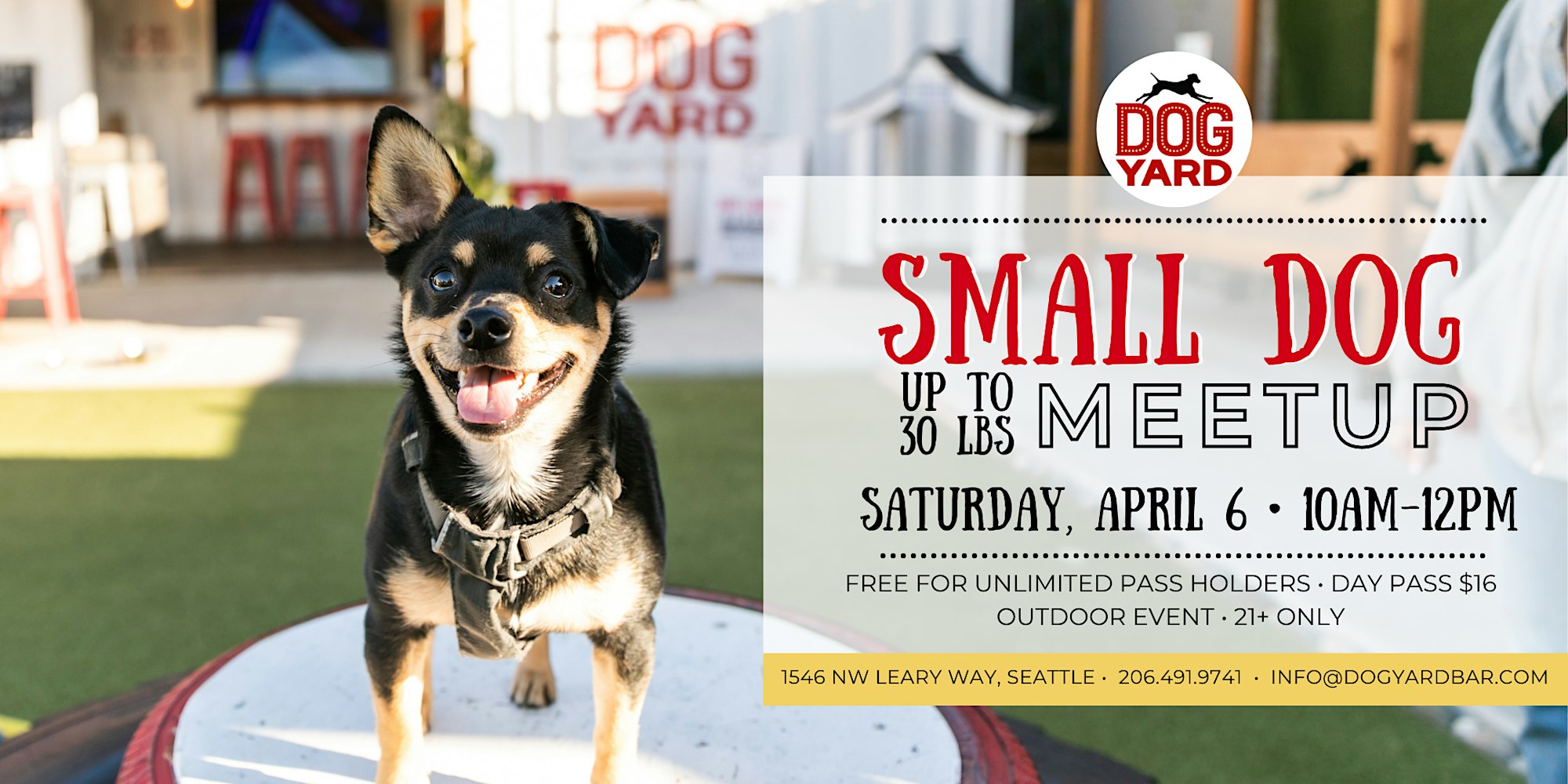Article-at-a-Glance
Discover the benefits of dog park playdates for socialization and exercise.
Learn the importance of planning and dog behavior for a successful playdate.
Understand how breed-specific meetups can cater to your dog’s unique needs.
Get tips on how to safely introduce toys and treats to a group of dogs.
Find out how to recognize if your dog had a positive playdate experience.
“Small Dog (<30 lbs) Meetup at the Dog …” from explorewashingtonstate.com and used with no modifications.
Maximizing Fun at Dog Park Playdates
Planning Your Visit for Maximum Playdate Success
Before you even step out the door, planning is crucial for a playdate that’s both fun and safe. First, consider your dog’s temperament. Is your furry friend a social butterfly or a bit of a wallflower? This knowledge will help you gauge the size of the playdate that’s best for your pup. Smaller, more controlled gatherings might be better for shy dogs, while outgoing ones may thrive in a larger group.
Next, timing is everything. Aim for off-peak hours when the park is less crowded to help your dog ease into the play environment. And don’t forget to check the weather! You’ll want to avoid extreme heat or cold that could put a damper on playtime fun.
Most importantly, ensure your dog is up-to-date on vaccinations and preventative treatments. This not only protects your pet but also is a courtesy to other playdate participants. Always bring water and a bowl to keep your dog hydrated, and poop bags are a must for keeping the park clean for everyone.
Creating Positive Interactions Among Pooches
Once you’re at the park, it’s time to focus on fostering positive interactions. Keep a close eye on body language — not just your dog’s but the others as well. Play should be reciprocal; if one dog seems overwhelmed, it’s time for a break.
Here are a few tips to ensure everyone gets along:
Introduce dogs on neutral ground, outside the park, to prevent territorial behavior.
Keep initial interactions short and sweet to avoid overstimulation.
Be ready to intervene if play gets too rough or one dog seems distressed.
Remember, as a responsible pet parent, your presence and attention are key. Don’t get too distracted chatting with other owners — your primary focus should be on the dogs’ interactions.
Specialized Socials for Specific Breeds
Benefits of Breed-Specific Gatherings
Breed-specific playdates can offer tailored social experiences that cater to the particular play styles and energy levels of your dog’s breed. For example, herding breeds may enjoy a more structured play involving chasing games, while brachycephalic breeds like pugs might need a laid-back environment to prevent overexertion.
Here are some advantages of breed-specific gatherings:
They allow dogs to engage in play that matches their instinctual behaviors.
Owners can share breed-specific tips and advice, from grooming to health concerns.
It reduces the risk of play aggression, as dogs of similar sizes and play styles are less likely to intimidate each other.
Therefore, if your dog is a particular breed, consider seeking out or starting a meetup for some specialized fun.
How to Find or Start Your Breed’s Meetup Group
Finding a breed-specific playdate in your area can be as simple as a quick online search. Websites like Meetup.com or local Facebook groups are great places to start. If there isn’t one already, don’t be shy about starting your own! Here’s how:
Post on social media or community boards to gauge interest.
Choose a dog park that’s central and accessible to interested parties.
Set a date and time, and clearly communicate the details to potential attendees.
And remember, the goal is to create a positive environment for all. Make sure to establish some ground rules for safety, like requiring up-to-date vaccinations and discouraging the sharing of toys if resource guarding is a concern.
Inclusive Play for Special Needs Canines
Special needs dogs may have physical disabilities, sensory impairments, or behavioral challenges that require a more mindful approach to play. Inclusive playdates for these pups can provide vital socialization opportunities in a supportive setting. This allows dogs with similar challenges to interact without the pressures they might face in a typical dog park scenario.
Understanding the Importance of Specialized Groups
Why are specialized groups so important? Well, they offer a sanctuary where special needs dogs can engage at their own pace. In these groups, owners are more likely to understand and empathize with each other’s challenges, whether it’s managing a dog’s anxiety or accommodating a physical limitation. These playdates aren’t just about fun; they’re also about building a community of support and sharing resources.
Tips for Organizing a Successful Special Needs Dog Meetup
If you’re considering organizing a meetup for special needs dogs, here are some key tips to ensure a successful event:
Choose a safe, enclosed area where dogs can explore without risk of injury or escape.
Keep the group size small to prevent overwhelming the dogs.
Provide clear information about the meetup’s focus to attract the right participants.
Consider having a vet or professional trainer present to offer guidance and support.
These playdates can become a lifeline for both dogs and owners, offering a sense of normalcy and joy amidst the challenges of caring for a special needs pet.
Sharing is Caring: Toys and Treats at the Dog Park
Guidelines for a Share-Friendly Environment
Bringing toys and treats to the dog park can enhance the play experience, but it’s important to do so thoughtfully. Here’s how to create a share-friendly environment:
Only bring toys that can be easily shared, like balls or frisbees.
Avoid toys that could cause possessiveness or resource guarding.
Offer treats only with the permission of other dog owners and in a controlled manner.
By being considerate with toys and treats, you’ll help ensure that all the dogs can have a good time without unnecessary conflict.
Another consideration is to be aware of any dietary restrictions or allergies. Always ask other dog owners before sharing treats, as some dogs may have specific needs or sensitivities.
Ensuring Safety and Fair Play Among Dogs
Even with the best intentions, not every dog will get along. Here’s what you can do to ensure safety and fair play:
Monitor interactions closely, especially when new toys or treats are introduced.
Be prepared to step in and separate dogs if play escalates to aggression.
Have a first-aid kit on hand for any minor scrapes or injuries.
These precautions help maintain a safe environment where all dogs can enjoy the fun of a playdate.
After the Wag: Wrapping Up Your Dog’s Day Out
Post-Meetup Considerations for Dog Owners
After the playdate, take a moment to reflect on the experience. Did your dog have fun? Were there any issues that need to be addressed for next time? It’s also a good practice to check your dog for any ticks, burrs, or minor injuries they may have picked up during play.
Additionally, consider reaching out to other owners to share any observations or to plan future meetups. Building ongoing relationships can lead to more predictable and enjoyable playdates for everyone involved.
Finally, give your dog a chance to rest and rehydrate. A happy, tired dog is usually a sign of a playdate well spent!
Observing Your Dog’s Behavior Post-Playdate
Monitoring your dog’s behavior after a playdate gives you insight into how they’re feeling. Are they relaxed and tired, sprawled out on the couch? Or are they restless, pacing around the house? These signs can tell you a lot about their mental and physical state after socializing with other dogs.
Keep an eye out for any changes in behavior that might indicate discomfort or anxiety. If you notice anything concerning, it might be worth consulting with a vet or a professional dog trainer to discuss your observations.
Remember, each dog is unique. What works for one may not work for another, so tailor your post-playdate routine to suit your dog’s individual needs.
Frequently Asked Questions
As a responsible dog owner, you likely have questions about ensuring the best possible social experience for your pet. Let’s address some common queries that might arise when considering dog park playdates.
How do I know if my dog is suitable for a dog park meetup?
Assessing your dog’s suitability for a dog park meetup involves understanding their personality and past behavior around other dogs. If they’re generally friendly and not prone to aggression, they’re likely a good candidate. However, start with smaller, controlled settings if your dog is new to socializing or you’re unsure how they’ll react.
What should I bring to a breed-specific dog park meetup?
For a breed-specific meetup, bring essentials like water, a bowl, and waste bags. Also, consider any breed-specific needs, such as a favorite toy or grooming supplies for after-play clean-up. And don’t forget your dog’s vaccination records for peace of mind for all attending.
Are special need dog groups available in most areas?
While the availability of special need dog groups can vary, they’re becoming more common. Check with local pet communities, veterinary offices, or online resources. If there isn’t one in your area, starting a group could provide a valuable service to the community.
Search online for existing groups or forums dedicated to special needs dogs in your area.
Contact local pet services and vets to inquire about any known groups.
Use social media to connect with other pet owners who may be interested in forming a group.
How can I introduce toys and treats safely to a group of dogs?
Introducing toys and treats in a group setting should be done carefully to prevent any conflicts. Always supervise closely and be aware of each dog’s behavior towards the items. If you notice any signs of possessiveness or aggression, remove the toy or treat immediately.
Furthermore, always ask for permission from other dog owners before offering treats to their pets, especially since some dogs may have dietary restrictions or allergies.
What are the signs of a successful playdate?
A successful playdate is one where all dogs interact positively, with relaxed body language and no signs of stress or aggression. The dogs should take turns in play, and there should be moments where they naturally take breaks and rest. Owners should feel comfortable and engaged, and the dogs should leave the playdate tired but happy.






